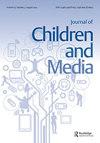Age recommendations for children’s films: associations between advisories on a U.S. site and parents’ ratings
IF 2.1
3区 心理学
Q2 COMMUNICATION
引用次数: 0
Abstract
ABSTRACT Parents may rely on media content classification systems such as those on the Common Sense Media website to help make decisions about what films are appropriate for their child. In this paper, we examine the relationships between Common Sense Media “expert” age/content ratings for 7132 films and the age recommendations made by parents commenting on the site. In addition to examining the extent of correspondence between these two sources of age classification, we examine whether “expert” ratings of the level of particular types of content in each film was associated with parents’ age classifications. Our research results indicate that age ratings of one out of five parents of our sample data cannot be predicted by the expert ratings. In general, parents tended to have stricter age recommendations than the Common Sense Media experts. Regression analyses indicate that parent age ratings showed (successively weaker) associations with expert ratings of the extent to which each film contained adult language, sex, violence, scary content, educational value, substance use, and consumerism. Impact Summary Prior State of Knowledge: Information and communication technologies have modified the way children entertain themselves, but also the complexity of parental mediation. Parents rely on content classification systems to help them make informed decisions about audiovisual content in linear TV but also on video-on-demand. Novel Contributions: We show that a percentage of parents cannot rely on experts’ age ratings, because they have different views on what is appropriate for their children. In addition, we try to explore how several factors influence parents’ views on age classification. Practical Implications: The study draws parents’ and policymakers’ attention, as we elucidate that audiovisual classification systems should follow a more personalized, parent-centric approach, so that parents are able to make informed decisions following their parenting views, without being suppressed by the norm.儿童电影的年龄建议:美国网站上的建议与家长评分之间的联系
摘要父母可能会依赖媒体内容分类系统,如常识媒体网站上的分类系统,来帮助决定哪些电影适合他们的孩子。在这篇论文中,我们研究了7132部电影的常识媒体“专家”年龄/内容评级与家长在网站上评论的年龄建议之间的关系。除了研究这两个年龄分类来源之间的对应程度外,我们还研究了每部电影中特定类型内容的“专家”评分是否与父母的年龄分类有关。我们的研究结果表明,在我们的样本数据中,五分之一的父母的年龄评级无法通过专家评级来预测。一般来说,父母往往比常识媒体专家有更严格的年龄建议。回归分析表明,父母年龄评分与每部电影包含成人语言、性、暴力、恐怖内容、教育价值、物质使用和消费主义的程度的专家评分之间的关联(依次较弱)。影响概述先前的知识状态:信息和通信技术改变了儿童娱乐的方式,但也改变了父母调解的复杂性。家长们依靠内容分类系统来帮助他们对线性电视中的视听内容以及视频点播做出明智的决定。新颖贡献:我们发现,一定比例的父母不能依赖专家的年龄评级,因为他们对什么适合自己的孩子有不同的看法。此外,我们试图探讨几个因素如何影响父母对年龄分类的看法。实际意义:这项研究引起了父母和决策者的注意,因为我们阐明视听分类系统应该遵循更个性化、以父母为中心的方法,这样父母就能够根据自己的育儿观点做出明智的决定,而不会被规范所压制。
本文章由计算机程序翻译,如有差异,请以英文原文为准。
求助全文
约1分钟内获得全文
求助全文

 求助内容:
求助内容: 应助结果提醒方式:
应助结果提醒方式:


